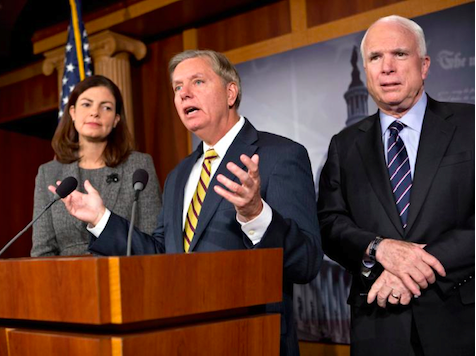It’s a mistake to set an “arbitrary date” for withdrawal of U.S. troops from Afghanistan, Sens. John McCain (R-AZ), Lindsay Graham (R-SC), and Kelly Ayotte (R-NH) said Tuesday.
Reacting to President Obama’s announcement that the administration plans to reduce the number of U.S. troops in Afghanistan to 9,800 when the combat mission ends this year and have a near total withdrawal of troops by 2016, the senators attacked the withdrawal plan as “a monumental mistake and a triumph of politics over strategy.”
“This is a short-sighted decision that will make it harder to end the war in Afghanistan responsibly,” the Republicans said in a joint statement.
The trio warned that while Obama came into office wanting to end the Bush wars, wars cannot be stopped just because a politician says they must end.
“The President appears to have learned nothing from the damage done by his previous withdrawal announcements in Afghanistan and his disastrous decision to withdraw all U.S. forces from Iraq,” they said. “Today’s announcement will embolden our enemies and discourage our partners in Afghanistan and the region. And regardless of anything the President says tomorrow at West Point, his decision on Afghanistan will fuel the growing perception worldwide that America is unreliable, distracted, and unwilling to lead.”
According to McCain, Graham, and Ayotte, instead of withdrawal the administration should have looked to incorporate a limited assistance mission to aid the Afghan Security Forces bring about a “negotiated end to the conflict.”
“The achievement of this goal, and the withdrawal of U.S. troops in Afghanistan, should be determined by conditions on the ground, not by the President’s concern for his legacy,” the threesome charged.
“All wars end. The question is how they end. The war in Iraq has ended in tragedy,” they continued. “And it is difficult to see how we can succeed in Afghanistan when the President tells our enemies that our troops will leave by a date certain whether they have achieved our goals or not.”
House Armed Services Committee Chairman Buck McKeon (R-CA) also criticized the president for taking a politics over strategy approach to the end of the conflict in Afghanistan, but did sound a positive note that the administration met the military’s request for forces in Afghanistan.
“[H]olding this mission to an arbitrary egg-timer doesn’t make a lick of sense strategically,” he said. “Does the President seek to replicate his mistakes in Iraq where he abandoned the region to chaos and failed to forge a real security partnership? We are in Afghanistan because it was the spawning ground of al-Qaeda and the devastating attack on American soil. Those threats still exist. We leave when the Afghans can manage that threat, rather than on convenient political deadlines that favor poll numbers over our security.”
House Speaker John Boehner noted that the “most potentially damaging and completely avoidable is quitting just short of the goal line” but added that he is pleased the level of forces meets what the military has requested.
“It has been my long-standing position that input from our commanders about the conditions on the ground should dictate troop decisions, and not an arbitrary number from Washington,” Boehner said in a statement. “I am pleased that today’s decision supports our military’s request for forces, but I look forward to hearing more specifics on how the proposed troop number will adequately cover the defined missions as well as provide appropriate force protection for our military and civilian personnel.”
According to Obama, however, who made his announcement Tuesday in the Rose Garden, the plan is “a responsible end” to the longest war in U.S. history, which began in 2001.
“The bottom line is, it’s time to turn the page on more than a decade in which so much of our foreign policy was focused on the wars in Afghanistan and Iraq,” Obama said. “When I took office, we had nearly 180,000 troops in harm’s way. By the end of this year, we will have less than 10,000. In addition to bringing our troops home, this new chapter in American foreign policy will allow us to redirect some of the resources saved by ending these wars to respond more nimbly to the changing threat of terrorism, while addressing a broader set of priorities around the globe.”

COMMENTS
Please let us know if you're having issues with commenting.